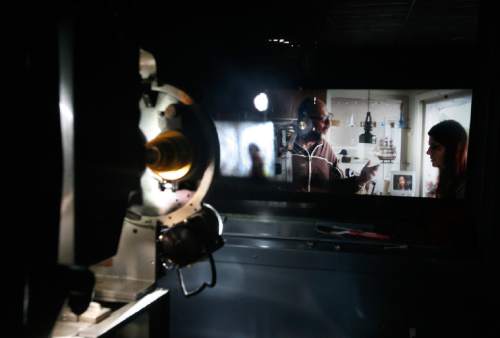This is an archived article that was published on sltrib.com in 2016, and information in the article may be outdated. It is provided only for personal research purposes and may not be reprinted.
The Salt Lake Film Society will not appeal a divided Salt Lake County Council decision rejecting the society's request to exempt its personal property — including equipment purchased with public money — from taxation.
Executive Director Tori Baker said the film society's board determined last week that the cost of pursuing the case through 3rd District Court was too expensive, considering county assessor records put the personal property tax at the Broadway and Tower theaters at $5,215.
Earlier this month, a 5-4 council vote affirmed a staff denial of the film group's request for an exemption, which was based partly on the argument it doesn't make sense for the county to tax projectors and other equipment bought with money provided by the county.
In this case, the film society bought digital projectors with a $125,000 grant from the county's facility master plan program. It's also received funding for seven years through the Zoo, Arts and Parks (ZAP) program. One of 23 large art groups to get top-tier ZAP funding, the film society received $275,800 in 2014.
Kelly Wright, assistant district attorney, did not dispute that the film society "provides entertainment and a community benefit" through offerings at its theaters.
But, he added, the Utah Constitution "requires [this personal] property to be used exclusively for educational or charitable purposes, and [our tax team] has looked carefully at the facts and we don't believe they qualify for either."
The digital projector and other equipment used in the theaters do not fit the Utah Tax Commission's definition for being educational, he said. That standard describes more traditional educational efforts.
Nor could the film society be deemed charitable, Wright added, noting its prices for movies are comparable to conventional theaters, and 7 percent of the films it features are shown elsewhere.
Samuel Lambert, an attorney for the film society, said the county's interpretation of educational and charitable standards was too narrow.
"Promoting the arts is a charitable endeavor, and it is an educational endeavor," he said. "All arts organizations are gifts to the community."
The film society educates through movies, the large majority of which are not shown in mainstream theaters. For those, Lambert said, "we are your only option. We don't choose films based on whether they're going to be a blockbuster. We choose them on their artistic merit."
The fact that there is some overlap, he added, reveals only that "sometimes Megaplex actually shows a good film that meets our standards."
Lambert also disputed the idea that charging entrance fees lessens the film society's charitable status, noting that the Utah Symphony/Opera and Ballet West have higher ticket fees for performances.
The issue left County Council members clearly in a quandary, torn between wanting to help the film society as a valuable ZAP contributor, but reluctant to reject the advice of their legal counsel.
"This community would be a lot less without you," said Councilman Jim Bradley, qualifying that endorsement moments later when he added that Wright made valid points about the difference between being an arts-performance group and "passing on a creative product. You aren't like the opera or ballet."
Bradley's Democratic colleague, Jenny Wilson, disagreed with his assessment. Noting that she has made a movie and believes "film has great educational value if it's done well," Wilson's motion to overturn the staff decision fell 5-4.
The majority sided with Republican Councilwoman Aimee Winder Newton, who observed, "we enter dangerous territory when we ignore the advice of the D.A. and listen to others."
Film Society's ZAP funding
The Salt Lake Film Society has received funding from Salt Lake County's Zoo, Arts and Parks program since 2008:
2008 • $3,947
2009 • $14,000
2010 • $39,100
2011 • $38,695
2012 • $40,144
2013 • $246,410
2014 • $275,800
Source: Salt Lake County



